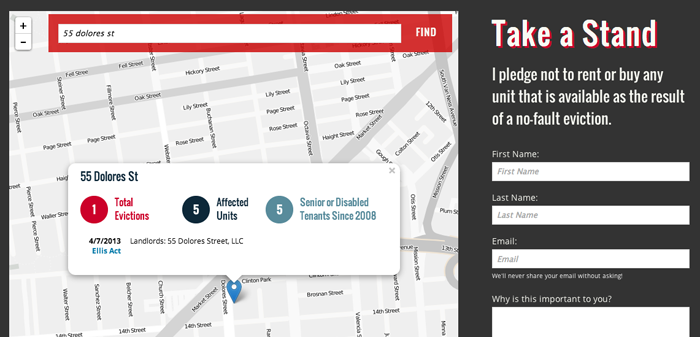Bay-Area Residents: Rent Responsibly
Don’t Move Into Housing Available Due to Eviction Law Abuse
The Anti-Eviction Mapping Project is unique in uniting technology and grassroots activism to fight Bay-Area evictions in the midst of a tech boom. The collective works with local residents and tech workers themselves to help combat gentrification and abuse of evictions laws — building open source tools that surface community data in useful ways, visualize the impact of gentrification on local neighborhoods, and expose serial evictors.
In the Bay Area, there has been a 115% increase in total evictions since last year, feeding off the toxic combination of an ever-growing bubble and unprecedented abuse of eviction laws by speculators. One way that tech workers can help is to make a conscious effort not to move into homes from which people have been evicted.
To mediate this process through tech, the Anti-Eviction Mapping Project has launched a new tool. The Anti-Eviction Pledge Project, announced today, makes it easy to look up San Francisco addresses to view their eviction history, letting residents see if a property is available due to Ellis Act or no-fault evictions. The site also offers a pledge San Francisco residents can take to indicate they will not move into homes vacant due to such evictions.
According to Kelsey Gilmore-Innis, the site’s back-end developer, “The nature of Ellis Act and owner move-in evictions, along with the booming prices for both buying and renting houses, mean that many of us who rent are at danger of being kicked out of our homes at any time. For my family and friends — who are teachers, fundraisers, artists, activists and other folks critical to a vibrant, healthy city — that means being forced to leave the city and their communities and families behind, for the sake of greedy speculation. It’s an absolutely terrifying situation to live in, and San Francisco deserves better than an atmosphere of fear, resentment, and loss.”
It is critical that Bay-Area tech workers take responsibility for their impact on the local community and economy. Tech workers must act both in their workplaces — urging their companies to pay taxes and invest in local businesses — and in their housing choices, refusing to move into places that have become available due to eviction abuse that disproportionately targets elderly, disabled and low-income Bay Area residents.




